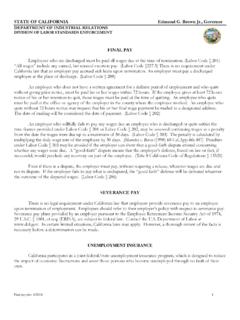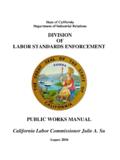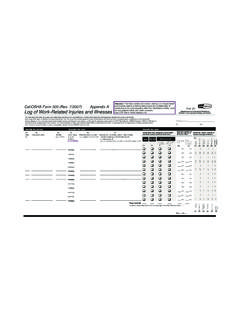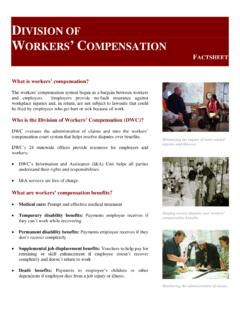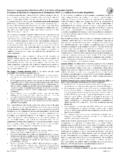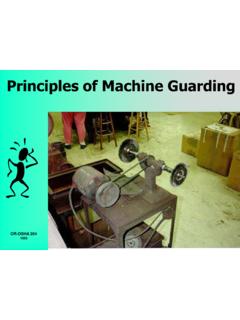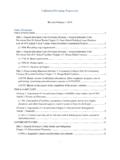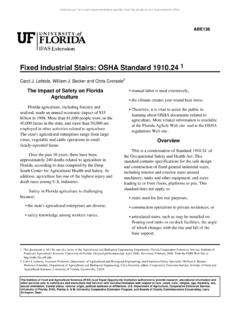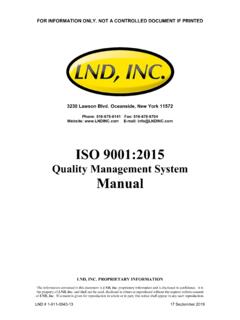Transcription of INDUSTRIAL WELFARE COMMISSION WAGES, HOURS AND …
1 OFFICIAL NOTICE. INDUSTRIAL WELFARE COMMISSION . ORDER NO. 7-2001. REGULATING. WAGES, HOURS AND WORKING CONDITIONS IN THE. MERCANTILE INDUSTRY. Effective July 1, 2014 as amended Sections 4(A) and 10(C) amended and republished by the Department of INDUSTRIAL Relations, effective January 1, 2019 pursuant to SB 3, Chapter 4, Statutes of 2016 and section of the Labor Code This Order Must Be Posted Where Employees Can Read It Easily IWC FORM 1107 ( ). OSP 06 98765. Please Post With This Side Showing . OFFICIAL NOTICE. Effective July 1, 2014 as amended Sections 4(A) and 10(C) amended and republished by the Department of INDUSTRIAL Relations, effective January 1, 2019, pursuant to SB 3, Chapter 4, Statutes of 2016 and section of the Labor Code INDUSTRIAL WELFARE COMMISSION . ORDER NO. 7-2001. REGULATING. WAGES, HOURS AND WORKING CONDITIONS IN THE. MERCANTILE INDUSTRY. TAKE NOTICE: To employers and representatives of persons working in industries and occupations in the State of California: The Department of INDUSTRIAL Relations amends and republishes the minimum wage and meals and lodging credits in the INDUSTRIAL WELFARE COMMISSION 's Orders as a result of legislation enacted (SB 3, Ch.)
2 4, Stats of 2016 amending section of the California Labor Code), and pursuant to section of the California Labor Code. The amendments and republishing make no other changes to the IWC's Orders. 1. APPLICABILITY OF ORDER. This order shall apply to all persons employed in the mercantile industry whether paid on a time, piece rate, COMMISSION , or other basis, except that: (A) Provisions of Sections 3 through 12 of this order shall not apply to persons employed in administrative, executive, or professional capacities. The following requirements shall apply in determining whether an employee's duties meet the test to qualify for an exemption from those sections: (1) Executive Exemption. A person employed in an executive capacity means any employee: (a) Whose duties and responsibilities involve the management of the enterprise in which he/she is employed or of a customarily recognized department or subdivision thereof; and (b) Who customarily and regularly directs the work of two or more other employees therein; and (c) Who has the authority to hire or fire other employees or whose suggestions and recommendations as to the hiring or firing and as to the advancement and promotion or any other change of status of other employees will be given particular weight.
3 And (d) Who customarily and regularly exercises discretion and independent judgment; and (e) Who is primarily engaged in duties which meet the test of the exemption. The activities constituting exempt work and non-exempt work shall be construed in the same manner as such items are construed in the following regulations under the Fair Labor Standards Act effective as of the date of this order: 29 Sections , , and Exempt work shall include, for example, all work that is directly and closely related to exempt work and work which is properly viewed as a means for carrying out exempt functions. The work actually performed by the employee during the course of the workweek must, first and foremost, be examined and the amount of time the employee spends on such work, together with the employer's realistic expectations and the realistic requirements of the job, shall be considered in determining whether the employee satisfies this requirement.
4 (f) Such an employee must also earn a monthly salary equivalent to no less than two (2) times the state minimum wage for full-time employment. Full-time employment is defined in Labor Code Section 515(c) as 40 HOURS per week. (2) Administrative Exemption. A person employed in an administrative capacity means any employee: (a) Whose duties and responsibilities involve either: (i) The performance of office or non-manual work directly related to management policies or general business operations of his/her employer or his/her employer's customers; or (ii) The performance of functions in the administration of a school system, or educational establishment or institution, or of a department or subdivision thereof, in work directly related to the academic instruction or training carried on therein; and (b) Who customarily and regularly exercises discretion and independent judgment; and (c) Who regularly and directly assists a proprietor, or an employee employed in a bona fide executive or administrative capacity (as such terms are defined for purposes of this section).
5 Or (d) Who performs under only general supervision work along specialized or technical lines requiring special training, experience, or knowledge; or (e) Who executes under only general supervision special assignments and tasks; and (f) Who is primarily engaged in duties that meet the test of the exemption. The activities constituting exempt work and non-exempt work shall be construed in the same manner as such terms are construed in the following regulations under the Fair Labor Standards Act effective as of the date of this order: 29 Sections , , and , and Exempt work shall include, for example, all work that is directly and closely related to exempt work and work which is properly viewed as a means for carrying out exempt functions. The work actually performed by the employee during the course of the workweek must, first and foremost, be examined and the amount of time the employee spends on such work, together with the 2.
6 Employer's realistic expectations and the realistic requirements of the job, shall be considered in determining whether the employee satisfies this requirement. (g) Such employee must also earn a monthly salary equivalent to no less than two (2) times the state minimum wage for full-time employment. Full time employment is defined in Labor Code Section 515(c) as 40 HOURS per week. (3) Professional Exemption. A person employed in a professional capacity means any employee who meets all of the following requirements: (a) Who is licensed or certified by the State of California and is primarily engaged in the practice of one of the following recognized professions: law, medicine, dentistry, optometry, architecture, engineering , teaching, or accounting; or (b) Who is primarily engaged in an occupation commonly recognized as a learned or artistic profession. For the pur- poses of this subsection, learned or artistic profession means an employee who is primarily engaged in the performance of: (i) Work requiring knowledge of an advanced type in a field or science or learning customarily acquired by a pro- longed course of specialized intellectual instruction and study, as distinguished from a general academic education and from an apprenticeship, and from training in the performance of routine mental, manual, or physical processes, or work that is an essential part of or necessarily incident to any of the above work.
7 Or (ii) Work that is original and creative in character in a recognized field of artistic endeavor (as opposed to work which can be produced by a person endowed with general manual or intellectual ability and training), and the result of which de- pends primarily on the invention, imagination, or talent of the employee or work that is an essential part of or necessarily incident to any of the above work; and (iii) Whose work is predominantly intellectual and varied in character (as opposed to routine mental, manual, mechanical, or physical work) and is of such character that the output produced or the result accomplished cannot be standardized in relation to a given period of time. (c) Who customarily and regularly exercises discretion and independent judgment in the performance of duties set forth in subparagraphs (a) and (b). (d) Who earns a monthly salary equivalent to no less than two (2) times the state minimum wage for full-time employment.
8 Full-time employment as defined in Labor Code Section 515(c) as 40 HOURS per week. (e) Subparagraph (b) above is intended to be construed in accordance with the following provisions of federal law as they existed as of the date of this wage order: 29 Sections , (a)-(d), , , , , and (f) Notwithstanding the provisions of this subparagraph, pharmacists employed to engage in the practice of pharmacy, and registered nurses employed to engage in the practice of nursing, shall not be considered exempt professional employees, nor shall they be considered exempt from coverage for the purposes of this subparagraph unless they individually meet the criteria established for exemption as executive or administrative employees. (g) Subparagraph (f) above shall not apply to the following advanced practice nurses: (i) Certified nurse midwives who are primarily engaged in performing duties for which certification is required pursuant to Article (commencing with Section 2746) of Chapter 6 of Division 2 of the Business and Professions Code.
9 (ii) Certified nurse anesthetists who are primarily engaged in performing duties for which certification is required pursuant to Article 7 (commencing with Section 2825) of Chapter 6 of Division 2 of the Business and Professions Code. (iii) Certified nurse practitioners who are primarily engaged in performing duties for which certification is required pursuant to Article 8 (commencing with Section 2834) of Chapter 6 of Division 2 of the Business and Professions Code. (iv) Nothing in this subparagraph shall exempt the occupations set forth in clauses (i), (ii), and (iii) from meeting the requirements of subsection 1(A)(3)(a) (d) above. (h) Except, as provided in subparagraph (i), an employee in the computer software field who is paid on an hourly basis shall be exempt, if all of the following apply: (i) The employee is primarily engaged in work that is intellectual or creative and that requires the exercise of discretion and independent judgment.
10 (ii) The employee is primarily engaged in duties that consist of one or more of the following: The application of systems analysis techniques and procedures, including consulting with users, to determine hardware, software, or system functional specifications. The design, development, documentation, analysis, creation, testing, or modification of computer systems or programs, including prototypes, based on and related to user or system design specifications. The documentation, testing, creation, or modification of computer programs related to the design of software or hardware for computer operating systems. (iii) The employee is highly skilled and is proficient in the theoretical and practical application of highly specialized information to computer systems analysis, programming, and software engineering . A job title shall not be determinative of the applicability of this exemption.
